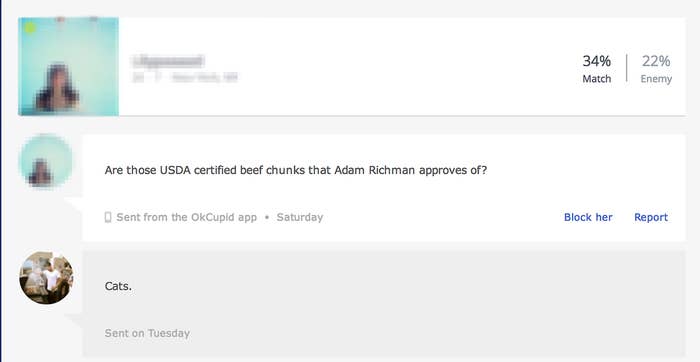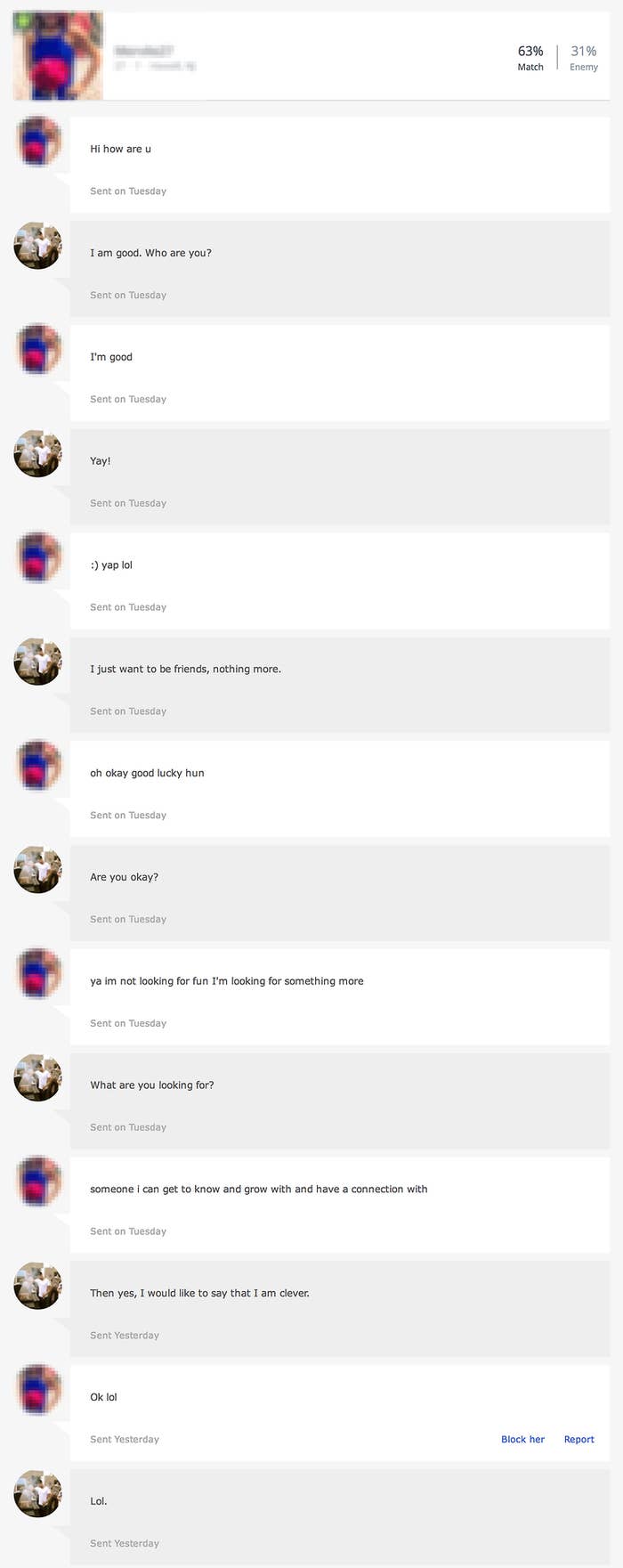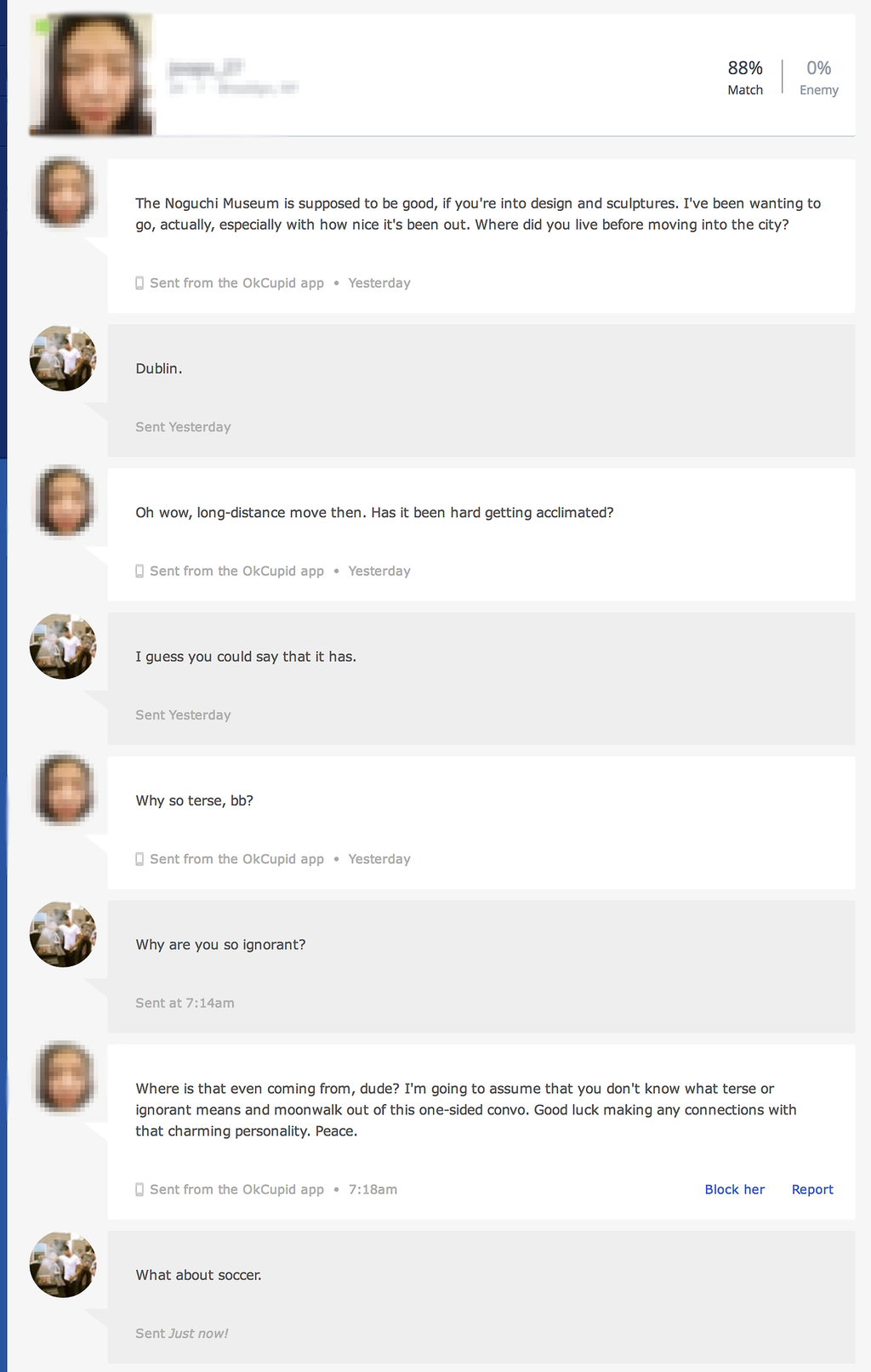
When Schuyler Hunt moved from Boston to New York for a job four months ago, he did what a lot of young Big Apple transplants do: He signed up for OkCupid. The 28-year-old quickly found online dating in New York to be entirely different from his experiences in Boston and Richmond, Va.
"I'd never seen anything like it," Hunt said. "As a nerdy guy, I was not used to getting inundated with requests. Everyone I talked to said that it's hard to find a guy here, and that the female market is really saturated."
Instead of being overjoyed, Hunt was overwhelmed and slightly discouraged. It seemed to him that the women messaging him weren't so much interested in him as in not being alone. He wasn't even sure if they were paying attention to his written responses.
"I was thinking: They don't care," said Hunt. "They just want somebody."
Hunt had recently seen the Spike Jonze film Her, about a lonely single man in the near future who falls in love with a dulcet-voiced operating system, and he started to form an idea. Could he create a bot, of sorts, that could convincingly do the work of a man on OkCupid? And what would that say about the state of online dating in New York?
In early July, Hunt, who works as a creative technologist at the ad firm Translation, started his project. Using photographs of a friend to start the profile, Hunt wrote "bland, average answers" and responded to the site's hundreds of yes-no question prompts randomly. The idea was to create a profile that was intentionally vague, one that didn't give potential matches much of a clue to his personality. In fact, the only signs of life on the profile were cheeky references to an interest in artificial intelligence and robotics.
Messages started pouring in to the fake man's mailbox. Hunt took each one and submitted it to Cleverbot, the artificial intelligence-powered web chatbot that has passed the Turing test, the famous human-fooling standard for AI articulated by the British computer scientist Alan Turing. Hunt fed Chatbot's responses back into OkCupid, and kept the conversations going on as long as possible.

The results were startling — at times hilarious, at times poignant — and Hunt, who had been uploading them to a private Tumblr, told his bosses, including Steve Stoute, the record executive. They encouraged Hunt not just to keep going, but to make his project public.
Hunt collected the conversations at Girls Who Date Computers, which he describes on the site as "A fake OkCupid profile ... created to see if anyone could ever talk to and fall in love with www.cleverbot.com." The conversations tend to follow a few scripts. In one, Cleverbot produces an enticingly enigmatic answer to a generic greeting (Girl: "How's it going?" Cleverbot: "Good. I'm almost finished.") and Hunt's interlocutor plays along for awhile, sometimes for a dozen or more messages. In another, Cleverbot produces an incredibly off-putting response (Woman: "Drinks are great for me. Ever around Union Square on a weekday after 6pm, we should meet up." Cleverbot: "Can you not be boring?") and the conversation ends abruptly. In every case, the conversations eventually hit a point at which Cleverbot's coy uncanniness ends the exchange.
Girls Who Date Computers arrives just as the debate over user experimentation, on OkCupid specifically and on social networks in general, swells. Last month, after users and web privacy advocates excoriated Facebook for showing different people different News Feed content as part of a broader experiment on emotional states, OkCupid's co-founder Christian Rudder forcefully defended the role of experimentation on users as a necessary practice in the evolution of websites in general, including his own.

Of course, Hunt doesn't own OkCupid and he can't feasibly claim to be trying to directly improve anyone's experience on the site (except maybe his own), only that he's trying to draw broader implications about the impersonal nature of online dating. And he seems to know what's he's doing is ethically ambiguous.
"I can say honestly that it's in a gray area," Hunt said. "For instance, I try to do things with my conscience guiding me, but anybody can do anything on OkCupid ... Did I ever feel bad for the individuals? Yes."
Hunt's claim — that dating sites and, by extension, social networks — are frontiers governed by unenforceable decorum, is hard to argue with. And it raises the idea that the most frightening amateur scientists on social networks aren't the ones running things, those who have financial considerations to moderate their laboratory instincts, but the ones using them.
Unlike OkCupid, Hunt hasn't notified any of the individuals in his experiment of their participation. He scrubs their profiles of identifying detail, and doesn't worry about causing any emotional harm: "I don't think anyone fell in love with the awkward randomness of the chat robot."

Hunt said he thinks any anger about his project will stem at least in part from the broader cultural frustration with the way dating works in urban centers today. "Human connections aren't real anymore," Hunt said. "Maybe no one is happy with it. People will be uncomfortable with this possibly because we can't meet people the same way we did a long time ago."
It's a hard point to refute. People who trust their personal lives to the control of an algorithm over which they exert no direct control may always come to resent that disempowerment, no matter if they are the subject of an "experiment" or not. Meeting people the old-fashioned way may be equally disempowering — reliant as it is on geography and class and myriad other factors — but perhaps it doesn't feel that way. It's easier to get angry at a website than it is to get at the sum total of chance events in a life.
And that seems to be what Hunt has taken from the project: a deeper discomfort with the apparent randomness and superficiality of online dating. While he's kept his personal OkCupid account, Hunt said that he's not sure he wants to meet his next partner that way: "I'm hoping to bump into someone walking down the street."
